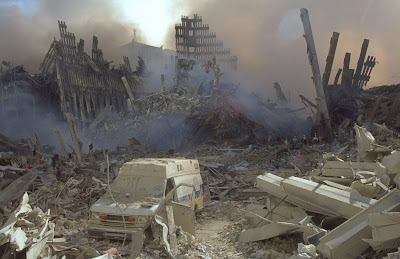On this anniversary of 9/11 EMS responders reverently watch the flag and remember those that were lost on September 11, 2001. Many EMS providers who have not experienced a large scale MCI may wonder, “How will I stay safe during a terrorist attack or large scale MCI?
Steve Kanarian, a retired NYFD EMS Lieutenant and EMS responder to many mass casualty incidents asked to share these five survival tips with Everyday EMS Tips readers on the anniversary of 9/11. Read and learn from Steve’s years of experience.
Scene size up. Stop. Look, Listen and Think. Allow time for your mind to process the scene you are faced with. While responding to a MCI you should monitor PD and FD frequencies. Upon approaching an MCI you should stop at a distance and observe what is happening. Has there been large-scale incident? Are numerous responders and victims experiencing SLUDGEMS? Should I wait for specialty resources to check for bombs and snipers? Staying in staging and waiting may be the hardest thing to do.
All Hazards approach. Focus on the hazards, the cause is often not known initially. For example the Oklahoma City Bombing was initially thought to be a gas explosion. The first attack on the World Trade Center was thought to be a transformer fire. Follow universal safety rules:
1. Stay upwind for heavy smoke
2. Stay uphill for liquid spills
3. Stay out of the collapse zone (Stage operations 2-3 times the height of the building away)
4. Expect secondary explosions/incidents
Personal Protection. Wear the appropriate level of protection. Wear respiratory protection, BBP protection and your helmet. If the incident is beyond your personal protection or training, stage at a safe distance, request specialty resources and wait for scene to be stabilized.

YOUR safety comes first. Stay in teams, avoid freelancing and frequently reassess hazards. Terrorist incidents may evolve and often use multiple attacks to focus on patients and responders.
Training. Cross train in various medical and rescue specialties. Prepare by thinking out of the box. Broaden your abilities by planning drills that challenge rescuers and exceed our normal range of experiences. Terrorist MCIs increase in lethality dramatically with each attack. “Worst case” scenarios may be a reality. Drills should be held with all players included. If you practice together you will succeed together at an MCI.
Steven Kanarian, MPH, EMT-P has over 25 years experience in EMS. Steve is a retired EMS Lieutenant and former FEMA USAR team member from the New York City Fire Department. Steve is the lead Instructor with the City University of New York, LaGuardia Community College Paramedic Program. Steve has been published in several EMS related journals and lectures on EMS topics.